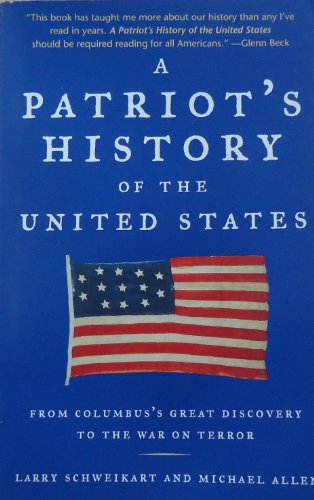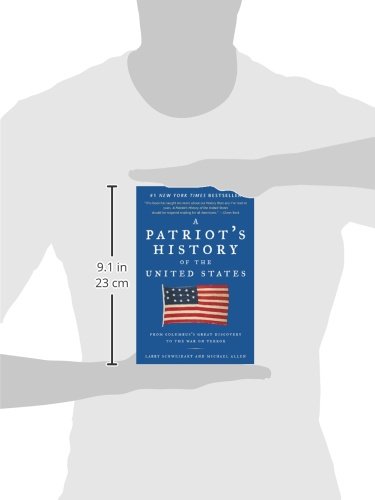



A Patriot's History of the United States: From Columbus's Great Discovery to the War on Terror
A**R
An Excellent Approach, Great Analysis with Some Detail Items Inaccurate
I was predisposed to view the authors' approach favorably in that an antidote to the left-wing and Marxist textbooks currently in use in American public schools and colleges is sorely needed. In fact, there have been some studies that have shown many high school graduates to actually believe that the US is a dangerous aggressor nation, that capitalism is an evil, and that the only solution is socialism under a world government. Where did they learn this? In school, of course, and if they go on to college such absurd beliefs will be reinforced. One can only wonder where this will all lead. The format of the book is to be commended, as well as the tenor of the writing. But keep your blue pencil out, because there are errors. For example, on page 78 the authors talk about Arnold's march to Quebec "Early in 1776" when it was actually made from September to November of 1775. There were not "many misguided" attempts to take Canada, but only two and it takes a lot of hindsight to label them "misguided." Canada was indeed the 14th colony, and although it seems today that efforts to incorporate it into the Continental government were doomed, it was nowise so certain at the time. Nor was Arnold's first attack on Quebec "repulsed" -- rather Arnold sent an emissary to demand the city's surrender which was refused since Maclean's Royal Highland Emigrant Regiment had arrived to defend the city. And saying that "Arnold staged a stubborn retreat that prevented British units under General Carleton from linking up with General Howe in New York" is a vast overstatement. On page 79, Washington did not "pressed on to Princeton..." -- rather he went around Cornwallis to escape to winter quarters in northern New Jersey and collided with a British detachment at Princeton. The authors make it appear that Washington took Trenton, then pressed on to take Princeton. That was not the reality of the situation. The discussion of the various drafts of the Declaration of Independence is confusing and somewhat inaccurate -- the authors talk about the minor editing of the final draft, then go back to discuss the many revisions of the original draft, but missing Jefferson's railing at the Catholic Scots who were almost 100% Tories. Other errors include the equating of Howe's strategy of occupying the major American political and populations center with the American "strategic hamlet" policy in Vietnam that widely misses the mark. Categorizing most of the females among Burgoyne's camp followers as "prostitutes" is also simply incorrect. Nor did Burgoyne's foraging units even run into the "famed Green Mountain Boys commanded by Ethan Allen" -- poor Allen was a British prisoner in England at the time. Nor did the Americans march Burgoyne's men "...to Boston, where they boarded transports for England..." -- the negotiations fell through, and Burgoyne's troops spent the next six years in American captivity as the "Convention Army." Okay, enough. The problem is that when authors are not entirely accurate with the details, should one believe the broader context? In this volume the answer is yes, but the errors in detail are simply jarring to an informed reader, and render the volume unusable in the classroom. In addition, the authors miss the impact of Common Law as one of the pillars of American strength and individual freedom. The development of Common Law versus Civil Law needs to be incorporated in every history book so that the students can learn why the US is an exceptional nation. We are governed by a system of laws that are rooted in the opinions of the people -- the laws do not descend upon the people from the King, Emperor, supreme religious authority or any other remote law-giver. The people determine and make the law here in the US -- the only nation so organized in the world today if one discounts Great Britain due to its follies and political subjugation to the EU. What is needed is for the authors to produce a second edition, one that has been carefully combed for factual errors, whether by actual statement or by inference. Yes, a volume that purports to present the truth in a uplifting and patriotic manner needs to be held to a higher standard than the Marxist garbage by Howard Zinn that is so favored by the academic community. One does not need to wonder about their agenda, and truth does have a way of ultimately coming out. The United States has done more good for the world than any other nation in history, and Americans can take pride in its history -- for all of its warts and fits. The authors are correct on this score, but let's reduce the errors so that those how oppose the US won't be able to discount this work due to its many errors.Amendment (2/15/2010) I wrote my review upon reading the hardcover edition of 2004. The authors have indeed come out with a new printing that corrects most of the errors I tripped over. They are to be commended for addressing the criticisms of a reader and correcting their narrative. As a result I increased my rating from three to four stars. The authors are currently working on another edition that is intended to eliminate all errors, and upon seeing that edition in print my remarks will be changed to reflect the accuracy of the facts to five stars and I'll eliminate all of the above discourse on the detail errors I found. In addition, a 2nd Edition is in the works that will no doubt eliminate my remaining points and strengthen the book. Frankly, I hope it will come out sooner rather than later. This is an important work that rights the wrongs done to our school children by Marxist textbooks, and should be present in every household. Absolutely recommended most highly.Dave Dougherty
B**N
True American History
Great American History book that will surely expose one to people and events that many weren't taught in high school. Not a book of rewritten history but true history by real American Historians.
P**S
A very good work - but.....
This is a very good history of the United States - covering the entire history from the origins of the nation till only a few years ago.It refutes a lot of myths - both of the left (such as that President Hoover was a free market "do nothing" President, or that F.D.R.'s policies saved the nation from the Great Depression) and the right - such as the idea idea that the Civil War was not really about slavery, and the Confederate leadership were pro freedom people hostile to big government (which is utter nonsense - as a close examination of both their words and actions shows).However, the book is not without flaws (no work on such a long period of history could be). I will point out the flaw I think is of most importance.The work misunderstands banking. For example, President Martin Van Buren is sneered at for creating an Independent Treasury that was basically a strong box on the lines of the "Middle Ages" - whereas he should have (the book implies) handed out Federal tax and land sale money to either an National Bank or to State banks - rather than kept it under lock and key and spent it to pay for government spending and to pay off any government debts (remember that Van Buren did not want to build a great pile of money - he just wanted to make sure that the government did not recreate the national debt and had money to hand to fund its expenses).What the authors fail to understand is that, whether money is given to a National Bank or to State "pet" banks (as Andrew Jackson did) an inverted pyramid of debt is built upon the money (via the shell game tactics of fractional reserve banking) - a bubble is created, a "boom" that inevitablly leads to bust.It is this fundemental failure to understand fiance (and ironically their sneering at people who did understand banking and finance - such as President Van Buren) that leads the authors to make their absurd statement (as recently as 2007) that Keynesian economics is "dead" in the United States - when at the very time they were writing the biggest credit money bubble of all time was already created and sitting there waiting to burst. A burst which (given the ignorance of banking and finance by modern people of power - both in politics and education and the media, and banking itself) could only lead to a panic and a desperate Keynesian response of trying to reinflate the bubble with yet more increases in the money supply and government spending.Writers such as Murry Rothbard may have been wrong (wildly wrong) about the Civil War - but they were right about money and banking and their impact upon American (and other) history. It is tragic that the authors failed to take on board their "hard money" insights.
D**S
Detailed and well written
In a period when many historians do their best to vilify our great country its refreshing to read a history that doesn't skip the bad decisions but focuses on the good.
A**R
Five Stars
Great account of USA history, bought as a student, but would highly recommend.
P**E
fascinating insight into US History
I must admit I did not now much about US history before reading this. I was looking for a book that gave a complete overview and had not been tainted by revisionist and leftist historians and this was everything that I was looking for. It showed warts and all but it did not try to bash the US at every opportunity. If you are looking for just one book on US history this is the one. Despite it's size it is very easily read and will keep you enthralled. Great book
A**R
This book is very thorough but dry
I liked to learn of American history, but found the reading a little dry and long winded...still this is FAR BETTER than reading the revisionist history of Howard Zinn...that bears no resemblance to the real history of America...I mistakenly tried to read through this book...better to keep as a reference...and pick up certain areas for research...
A**R
One of the best books on the history of the USA.
Makes very good reading for people interested in history.
A**N
Excellently written and highly informative.
I am trying to complete my history degree here in Southern Ontario, Canada (I am Canadian). When I was in high school, my teacher was very centre on the political spectrum and made history simply fun. No bashing Americans (notwithstanding Bush) and a respect for Canada's early PMs and America's founding fathers. This is why I decided to take history at the university level... I was expecting the same entertaining and unbiased history that I received in high school; unfortunately, and unbeknownst to an 18 year old, I entered the Marxist/Communist headquarters at the University of Windsor, and would be forced to conform to their ultra left politics or face poor grades. Note that all universities in Canada are far left unless one takes business, law, science, and engineering. I am sure this is the same in the United States but to a slightly lesser extent.Buy this book if you want to enjoy history again from a true American perspective. Larry Schweitkart and Michael Allen have my utmost respect and have renewed my passion for a entertaining form of history, a true history.Thank you,A
Trustpilot
5 days ago
3 weeks ago